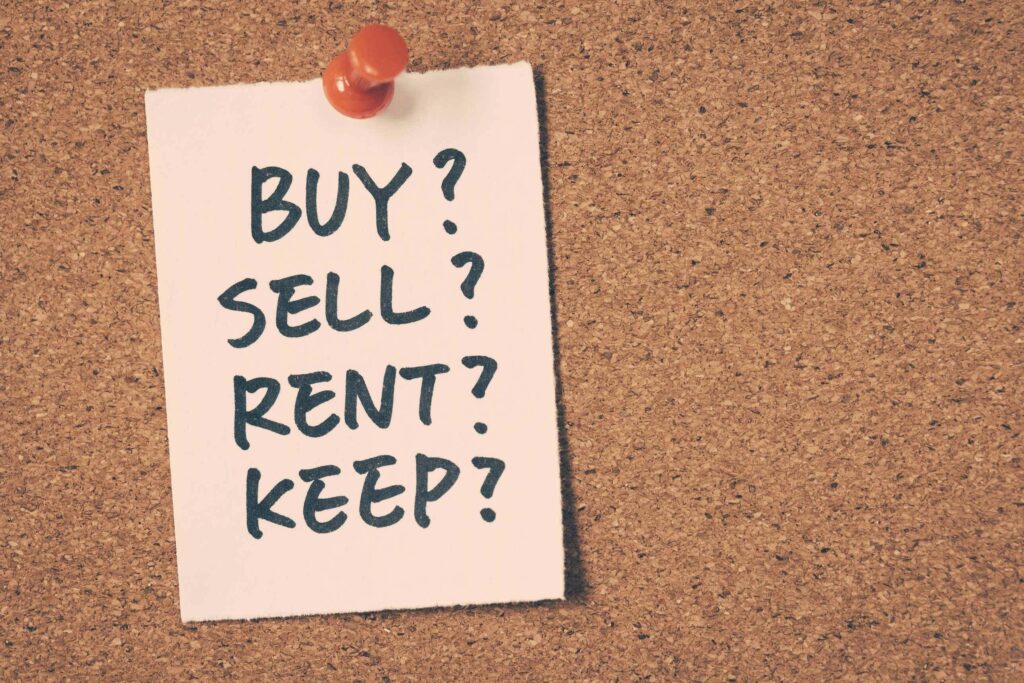Whether selling or renting out your home is the right step to take will depend on your personal circumstances and your own needs.
Here, we’ll explore the pros and cons to selling and renting out your property and we’ll explain the things you’ll need to consider if you decide to go down the rental route.
We’ll also explain everything you’ll need to do to rent out your home…
Can I rent out my house?
If you have a mortgage on your home, you may need permission from your lender to rent it out.
If you’re planning to rent out your property for a certain period of time before moving back in, your lender may agree to let you do this through your current mortgage deal.
This is known as ‘consent to let’ and will usually allow you to rent out your property for up to 12 months.
However, if your plan to rent out your home is more permanent, your lender will require you to move on to a buy-to-let mortgage – either with them, or with a new lender.
When you should consider renting out your house
There are a host of scenarios that could mean renting out your property, rather than selling it, is a better step for you to take:
- You’re moving out temporarily
- You’re buying another property with a new partner and want to keep a property as an investment
- Your property is on the market but isn’t selling and you need to move quickly
- You’re unsure if you want to move and want to ‘test the water’ in a new location, while keeping your home if things don’t go to plan
- You want to use your home as your first rental property and start building a property portfolio
When you should consider selling your house
Selling your house, rather than renting it out, could be a better option for you if you find yourself in any of these scenarios:
- You need to release the money tied up in your home to buy your next property
- You’re moving a long way away and want to remove ties to your current location
- You can’t afford to own your current property as a buy-to-let and buy another home to live in
- You’re in financial difficulty and need to pay off your mortgage by selling your home
- You don’t want to become a landlord
Should you sell or rent out your property? The pros and cons
There are several pros and cons to selling your home or renting it out and you should consider each against your own circumstances and needs…
The pros and cons of selling
|
Pros |
Cons |
|
You could release equity to buy your next home |
Selling could mean you miss out on further growth in your home’s value |
|
You won’t have to pay capital gains tax if your home is your main residence |
If your property is worth less than your mortgage, you’ll have to find the difference to pay off the loan |
|
You won’t be responsible for more than one property |
Selling a property can take a long time |
The pros and cons of renting out your property
|
Pros |
Cons |
|
Renting out your home could provide you with a steady income stream |
You may need to invest money to bring your property up to rental compliance standards |
|
You still own your property, so you could benefit from long-term capital growth |
You may have ongoing maintenance costs |
|
The rent will cover your mortgage, releasing you from that particular burden |
You’ll pay more stamp duty if you own more than one property |
|
If your circumstances change, you still own a property you can live in |
You may have to pay capital gains tax if you decide to sell the property |
Things to think about before renting out your house
Renting out your home is a big step to take.
You’ll become a landlord and that means taking on the responsibility that comes with the role.
Here are the main things you’ll need to consider before renting out your home…
1. Income tax
Before renting out your property, you’ll need to factor in the added tax commitments you’ll have as a landlord.
Your rental property will give you an income, which means you’ll have to pay income tax.
The amount you pay will depend on:
- Which income tax band you fall into
- Your other sources of income
- Whether your property is owned by you or a company
If you already pay tax on other sources of income, your rental income will be added to that, and you’ll need to complete a self-assessment tax return to work out what you owe.
However, if your property is placed in a company structure, you’ll pay corporation tax on your rental profits instead and only pay additional income tax on any money you take from the company.
Before deciding whether to rent out your home, speak to an independent financial advisor about the tax implications you’ll be facing.
2. Capital gains tax
If you sell your home and it’s your main residence, you won’t have to pay any capital gains tax (CGT).
However, as soon as your home becomes a rental property, you may be liable for CGT if you sell it in the future.
CGT is due on any ‘gain’ you make – so, the difference between what you paid for your property and what you sell it for.
As your property used to be your main home, your CGT bill may be reduced by taking into account the time you spent living there.
This is known as Private Residence Relief.
And if you haven’t made a gain beyond your personal allowance (£12,300 in 2021), you won’t have to pay any CGT.
As with income tax considerations, always seek advice from an independent financial advisor on your potential CGT liabilities.
3. Additional costs
When your home is rented out, there are a host of additional costs you’ll need to factor in, including:
- Additional stamp duty charges if you buy another property
- Costs for gas and electrical safety checks, fire safety assessments and installation of smoke alarms
- Further renovation and repair costs to bring the property up to standard for tenants
- Costs when the property is empty, including mortgage, council tax and utility bills
- Letting agent fees
- Ongoing maintenance costs
- Landlord insurance
- Replacement / repair of white goods / furnishings
4. Compliance
There are hundreds of pieces of legislation you’ll need to comply with when renting out your home, including:
- Gas and electrical safety
- Fire safety assessments
- Tenancy deposit protection
- Smoke and CO alarm installation
- Legionella risk assessments
- Right to Rent checks
- Minimum Energy Efficiency Standards (MEES)
Staying on top of current legislation and being aware of changes coming into force are crucial aspects of being a landlord and keeping your tenants safe is vital.
The best way to ensure you remain compliant is to use a letting agent’s management service.
5. The local rental market
Before renting out your home, you should explore the local rental market where you live.
Is there demand for properties like yours and how good is the competition?
Speak to your local letting agent and ask them to look at your property.
They’ll be able to advise on its potential as a rental property and make suggestions that will make it stand out to potential tenants.
How to rent out a house
If you’re set on renting out your home, you’ll need to go through several steps. Here’s what you can expect…
1. Get your lender’s permission
Speak to your mortgage lender and see where they stand on your property becoming a buy-to-let.
If you’re planning to rent out your home for a fixed period, you may be able to stay on your current mortgage deal.
But if your home is going to become a more permanent buy-to-let property, you may have to take out a buy-to-let mortgage.
2. Choose a letting agent
Using a letting agent’s full management service is the best way to ensure your property remains compliant and you get the best possible tenants in place.
Under a full management agreement, your agent should:
- Ensure all compliance requirements are taken care of, including annual gas and electrical safety checks
- Market your property to potential tenants, including through the online portals
- Accompany potential tenants on viewings
- Provide a full tenant referencing service
- Undertake Right to Rent checks
- Provide a tenancy agreement and other documentation
- Arrange an inventory at the start and end of each tenancy
- Collect monthly rent
- Protect all tenant deposits
- Manage ongoing maintenance and repairs
- Inspect the property regularly
- Chase tenant arrears and issue notices for possession
- Deal with tenancy renewals and perform an annual rent review
If you decide to manage your rental property yourself, you would be responsible for all compliance and tenancy demands.
3. Check your property is compliant
If you decide to use a letting agent’s full management service, they will ensure all compliance and health and safety requirements are met.
But if you’re self-managing, you’ll need to make sure your property is legally ready to rent out.
4. Arrange landlord insurance
Although landlord insurance isn’t a legal requirement, your mortgage lender will almost certainly insist you have a valid buildings insurance policy in place.
Other aspects of landlord insurance you should consider, on top of buildings insurance, include:
- Contents insurance if you’re renting out your home on a furnished basis
- Tenant liability insurance, which covers you if someone is injured while visiting your rental property
- Legal expenses insurance, should you need to go through the court process to evict a tenant
- Tenant default insurance, which covers you for lost rent should you tenant be in arrears
5. Advertise your property
If you’re using a letting agent, they should advertise your property on the main online property portals, as well as market it through social media and other digital platforms.
If you decide to advertise your property yourself, you’ll need to consider any additional costs for doing so.
6. Perform tenant checks
Your letting agent will undertake thorough referencing and financial checks to ensure the tenants who want to rent your property are suitable.
If you decide to do this yourself, you should:
- Request proof of identity and address
- Request proof of income
- Seek references from previous landlords
- Obtain an employer’s reference
- Undertake a credit check
- Complete Right to Rent checks for immigration purposes
7. Collect and protect your tenant’s deposit
Legally, all tenancy deposits must be protected in one of three government-approved schemes.
A letting agent will do this for you but if you’re managing your property yourself and fail to lodge your tenant’s deposit within 30 days of their tenancy starting, they could take you to court and seek compensation. You’ll also be unable to issue a section-21 notice to regain possession of your property.
As well as protecting your tenant’s deposit, you must also tell them, within 30 days:
- The address of the rental property
- How much deposit you have protected
- The deposit protection scheme you’ve used
- The letting agent’s name and contact details (if using)
- How your tenant can apply to have their deposit returned
- The process should there be a dispute over their deposit
8. Do an inventory
Inventories set out the condition of your property at the start of the tenancy and are vital in the event of a deposit dispute.
Photos should be included with any inventory, both at the start of the tenancy and the end.
By using a letting agent’s full management service, inventories will be taken care of for you.
9. Stick to the rules on visits and inspections
Regular property inspections are vital and a great way to keep on top of any potential maintenance problems at your property.
However, if you wish to inspect, or visit, your property at any time, you must give your tenants at least 24 hours’ notice.
10. Be a good landlord
Try to build a relationship with your tenants based on mutual understanding.
Outline what’s expected of them, but also be sympathetic to their needs and circumstances.
A good landlord leads to good tenants and good tenants can often mean fewer costly void periods.




